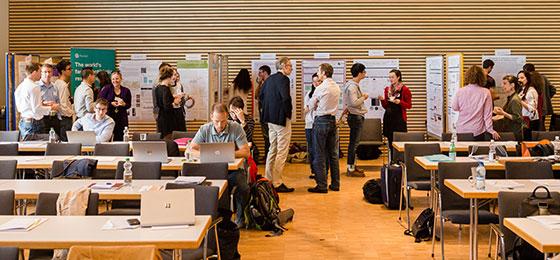NRP 72 in 2018: All projects underway, focus now on overall collaboration

With 42 projects in all areas of resistance research, NRP 72 covers an impressive range of topics. This makes efficient and effective collaboration within the programme and with external partners all the more important. For this reason, NRP 72 focused on networking activities in 2018.
Exchange between researchers at the 2018 programme conference
Excellent science across the board
In 2018, 17 new projects were launched within the scope of the National Research Programme "Antimicrobial Resistance" (NRP 72), bringing the total number of projects up to 42. No further projects will be added to module 1 ("Development and spread of resistance") and module 3 ("Optimised use of antibiotics") of the programme. In module 2 ("New drugs and faster diagnostic techniques") three more teams will start work at the beginning of 2019. These projects will be selected based on a call of the international research platform Joint Programming Initiative on Antimicrobial Resistance (JPIAMR), in which Swiss institutions will collaborate with international partners. The president of NRP 72, Christoph Dehio, is satisfied with the thematic range of the projects selected for the programme: "Our aim was to bring together outstanding projects that represent all areas of resistance research. This aim has been reached." The challenge now is to intensify collaboration within this wide-ranging programme and focus on the shared goals.
Building communities
The second programme conference of NRP 72, which took place on 18 and 19 April in Nottwil, was geared towards this aim. Over a hundred researchers got to know each other and each other's projects and explored the possibility of synergies. This has brought the researchers together and has already led to a number of new collaborations, e.g. between groups developing diagnostic tests and research hospital labs: by testing new diagnostic technologies with currently existing resistant germs, researchers will be able to optimise their accuracy and user-friendliness.
The Steering Committee of NRP 72 commissioned an evaluation study with the aim of intensifying interdisciplinary collaboration. The study was launched in July by a team from the University of Bern, whose task it is to identify the existing potential together with the researchers and propose ways of realising it. They are expected to present their results and discuss them with the NRP researchers at the programme conference on 27 and 28 March 2019 in Lausanne.
Beyond the programme: exchanges with science and society
However, the aim is for NRP 72 to have an impact also beyond the research community directly concerned. Scientific conferences offer a good opportunity for doing this. Consequently, NRP 72 presented two sessions on antimicrobial resistance at this year's conference of the Swiss Society of Microbiology. True to the one-health approach of the programme, researchers from all programme modules presented their field and their work and engaged in discussions with the scientific community. In addition, researchers of the NRP organised two specialised conferences on Monte Verità: one of them focused on the phenomenon of bacterial persistence, the other on the spread of bacterial resistance in water bodies (see links below for reports and interviews).
There were other networking activities that took place in 2018, among them the collaboration with those responsible for the National Strategy on Antibiotic Resistance (StAR). The researchers of the NRP, in particular of module 2, also discussed their projects with industry partners at the annual meeting of the National Thematic Platform "Antibiotics" of Biotechnet Switzerland. "Communicating with stakeholders in the industry and in society is paramount for applied research," says Christoph Dehio, president of the NRP. "We are pursuing this collaboration continually to ensure that new approaches will find their way into practice."
- Programme portrait NRP 72 (PDF)
- Overview of all projects
- Programme conference 2018
- Evaluation study Interdisciplinarity
Reports and interviews from the conferences:
- The reservoir of resistance genes in waterways is increasing
- Persistent bacteria could aggravate the problem
